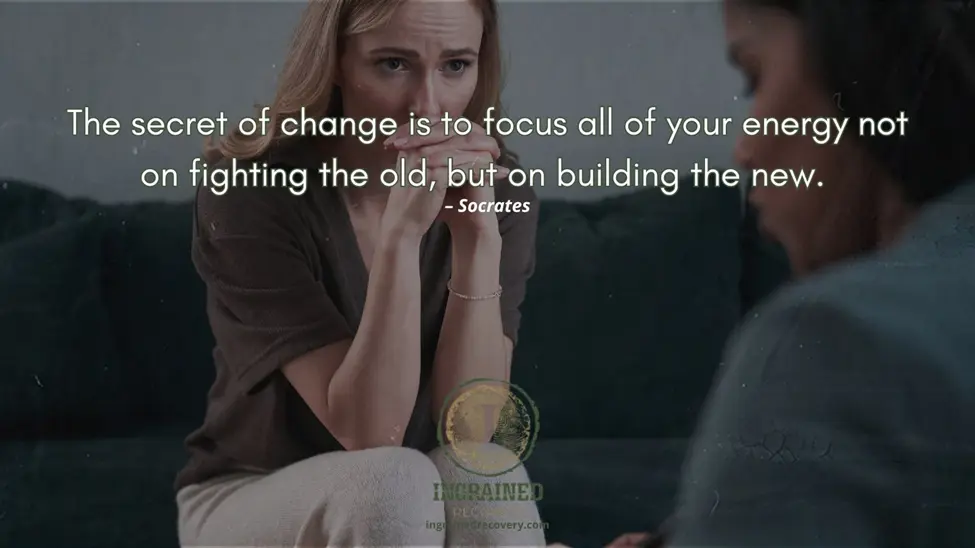Developing Life Skills During Treatment at Ingrained Recovery
Have you ever wondered about the new life skills for recovering addicts? Having a drug-free environment is undoubtedly part of this equation. But how do basic life skills help ensure continued success on your recovery journey? For some, it’s hard to see how the coping strategies mastered during addiction recovery can apply to everyday life.
From developing healthy habits to coping skills for dealing with substance abuse triggers, the essential life skills you learn at the treatment center are important for sustaining good mental health.
Trying to overcome a substance use disorder might often feel like trying to swim up a strong river – you make a little progress, then fight the current to resist getting swept away.
The Ingrained Recovery team understands that full recovery doesn’t mean mere self-control. It requires replacing old habits with new, positive habits and problem-solving skills.
We encourage you to keep reading to learn how life skills training can help with recovery from drug and alcohol use.
Get Proven Detox And Rehab Options Now!
Find Help At Ingrained Recovery
Why Life Skills Training Is Necessary for Everyday Life After Recovery
The Substance Abuse and Mental Health Services Administration, or SAMHSA, defines four major dimensions for a fulfilling life and continuing recovery:
- Health: Managing sober living after addiction and making healthy choices for better physical and mental wellness.
- Home: A safe, stable place to live is necessary for a secure daily life after substance addiction.
- Purpose: Having independent life skills that allow for meaningful activities. These are job skills, school or education, family needs, and working.
- Community: Creating healthy relationships and networking, allowing people in recovery to form new friendships and maintain healthy relationships.
Why are these life skills important? The four dimensions offer professionals involved in recovery-oriented work a holistic framework as they support people transitioning from addiction to a new life.
What Are the Important Life Skills Needed for Recovery?

Here are some areas where learning life skills become a part of the recovery process:
The Importance of Self-Care for a Healthy Lifestyle
Many clients arrive for addiction treatment with relatively poor self-care skills and low self-confidence that requires nourishment and support. Knowing how to care for yourself is vital for successful recovery.
Some self-care tools that support independent living and sobriety include:
- Getting enough sleep
- Making healthy food choices and preparing your own meals as part of a nutritious diet program
- Exercising daily
- Keeping a clean living space
- Learning how to manage stress without drugs or alcohol (yoga, journal writing, prayer)
These habits improve your mindset and physical health.
Example:
‘Charmaine’ completed addiction recovery and felt optimistic about her future. She had previously drank to escape the constant ache of depression. She learned that managing stress, good nutrition, taking her prescriptions, and walking daily boosted her mood.
Using Interpersonal Skills and Forming New Relationships
Building a solid support network is vital during recovery. You must know how to build trust and set boundaries with others.
To do this, you must learn:
- Honest and effective communication skills
- Self-expression
- Conflict resolution strategies
Why is it so important to develop these social skills? You must leave behind friends who are still active users to maintain sober living. The ability to communicate effectively will help you keep your life moving forward instead of revisiting past negative acquaintances.
Example:
‘Frank; had learned that his “friends” didn’t always have his best interests at heart. After a heroin overdose, those with Frank left him lying on a sidewalk to die. After leaving the addiction recovery center, Frank used his communication skills to reconnect with family and friends who had given up on him.
Financial Management to Maintain Your Sober Life

You might wonder why financial responsibility counts as recovery life skills. While it’s true that money isn’t everything, it does provide you with the means to manage daily life from a more comfortable position. It also allows you to achieve your life goals.
Some components of financial management are the following:
- Self-awareness of your wants (the new gaming system you’ve been eyeing) vs. needs (a roof over your head and healthy foods in the fridge)
- Creating and sticking to a budget
- Tracking expenses
- Managing a savings account
- Informed financial decision-making skills (home ownership, retirement savings, or investing)
It shares an overlap with stress management, as keeping track of your money can prevent relapse triggered by financial strains.
Example:
‘Trish’ used her financial life skills to get back on her feet after recovery. She stayed with her stepmom for several weeks and used the money she’d otherwise have spent on alcohol to save for a deposit on an apartment. The money increased so fast that she was encouraged to make better choices.
Time Management Builds a Stable, Productive Life
Learning time management tools is arguably one of the most crucial life skills. These are essential life skills for every part of life, from career goals to taking advantage of educational opportunities.
Here’s the truth about time management. You can’t land a well-paying job if you can’t make it to the all-important job interview on time.
Some specific life skills related to managing time include:
- Setting priorities
- Creating and following schedules
- Breaking tasks into small, achievable steps
- Staying organized
- Tracking progress
- Celebrating milestones (boosts self-esteem)
When you practice time management, you’ll increase your employability and career trajectory. You’ll have more opportunities to experience success and the means to continue sober living.
Example:
‘Martino’ had not worked a job in a while because of his meth addiction. He found an entry-level job and impressed the manager with his uncanny ability to get things done efficiently. Martino soon earned a promotion and built a career as a customer experience specialist with a top tech company.
Emotional Regulation and Releasing Negative Emotions

Managing your emotions is one of the most fundamental recovery life skills. During addiction recovery, you worked on healthy coping mechanisms to manage stress, anger, and triggers.
You may not realize it yet, but the need to apply these emotional regulation skills will occur. Triggers for substance abuse are everywhere, even when you do your best to avoid them. One helpful tool is the acronym HALT, which stands for Hungry, Angry, Lonely, Tired, and can be a helpful ‘barometer’ of when to rest, eat, or seek out support and fellowship.
When you recognize the negative feelings that could lead to an emotional relapse, you’ll have these coping strategies to fall back on:
- Deep breathing or muscle relaxation exercises to ground you
- Journal writing to release the negativity
- Visualization techniques
- Calling an AA or NA sponsor or a friend from support groups for reassurance
Applying these emotional life skills in recovery can help you with good decision-making when you feel triggered.
Example:
When ‘Lee’ felt triggered, they grabbed their journal and started writing down their emotions. They found this distracted them long enough to avoid smoking crack.
Involvement with a Community Organization
One of the most meaningful ways to apply your new social skills is to become involved in the local community.
For some, this could mean getting involved with local support groups and meeting others on a recovery journey. For others, giving back after addiction treatment might mean volunteering in a local initiative. Either way, using your life skills training in the real world is an excellent way to avoid boredom that could trigger the desire to use drugs.
Example:
‘Terry’ needed to re-establish employment but had no recent work history due to his time in addiction recovery. He took a volunteer job to brush up on these life skills. After several weeks of proving his ability as well as taking drug tests at work, the supervisor of the outreach center was willing to write a reference letter. It worked, and Terry found a paying job.
Up To 100% of Rehab Covered By Insurance
Find Help At Ingrained Recovery
Call Ingrained if You Need Additional Support Learning Life Skills
Apply life skills in recovery is not always as simple as it might appear on the surface. After completing formal recovery, recovering people may find themselves in need of some extra help. That’s okay and happens more frequently than you might think. Addiction recovery rarely follows a straight line. Instead, it’s full of dips and curves that can test your life skills training.
If you still need support with any key coping mechanisms, from decision-making to problem-solving to communication skills, consider contacting Ingrained Recovery. Our team can help you get the additional support and life skills training you need to keep all the gains you’ve made during addiction recovery.
Call our admissions team today for additional life skills help.

